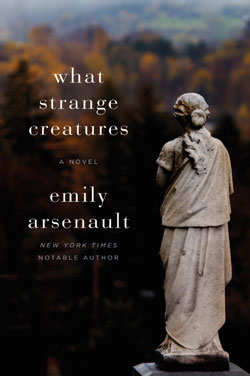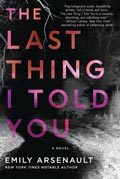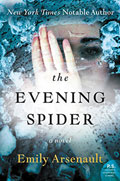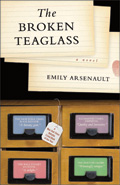 Prologue
Prologue
Tuesday, October 22
What are you supposed to do on the second night your brother is in jail on a murder charge?
Should you watch The Colbert Report? Should you clean the black crud from behind your kitchen faucet? Should you make yourself a smoothie with protein powder?
I did all of these things, trying to forget the prosecutor’s words: Her body was found in a wooded area, about ten yards from the side of Highway 114. According to autopsy reports, she died of strangulation and also had a deep wound in her upper left thigh, consistent with assault using a screwdriver or scissors.
But what was I supposed to do? Was I supposed to settle into the situation and practice saying things like, “Jeff? You didn’t hear? He’s in the clink. Homicide.” Or in reminiscent fashion, with a long, throaty cough and the resigned wave of a cigarette: “Back when Jeff was still on the outside …”
Probably I wouldn’t need to practice. Probably one grows used to saying these things, as the first nights turn into first weeks, then months and years. I’m a Battle, after all. And Battles get used to all sorts of shitty things—like noisy mufflers and bad lighting and generic plastic wrap that sticks to nothing but itself and your angry, frustrated fingers.
Police investigators obtained a search warrant for Mr. Battle’s apartment and vehicle. In the trunk of the vehicle, in the spare-tire compartment, they found a screwdriver with blood on it.
Finally I settled on the dog bowls and cat dishes. Yes—that was what needed to be done next. They all had a fine layer of Iams crust on them, from days of hasty feedings—bribing the poor dears with wet food as I dashed home briefly between trips to Jeff’s place, the prison, my job, the courthouse. Now I collected the dogs’ metal bowls and the cats’ delicate ceramic dishes, dumped them in a plastic tub in the sink with some Palmolive, and ran the water till it was scalding. I winced as I plunged my hands into the soapy water.
Police also found that Mr. Battle’s trunk had been saturated with vinegar and an ammonia-based cleaning liquid.
Tears sprang to my eyes.
My brain struggled to find words to drown out the prosecutor’s and came up with this:
And, daughter, don’t be at all afraid, for it is a singular and a special gift that God has given you—a well of tears which man shall never take from you.
I recited the original words softly to myself:
“And, dowtyr, drede the nowt, for it is a synguler and a specyal gyft that God
hath govyn the, a welle of teerys the whech schal nevyr man take fro the.”
I’d memorized this sentence at a different time in my life, when feeling smart had been a misguided priority. It was comforting now—not for its content so much as the sound of the Middle English. I’d always liked its long-ago, faraway feel in my mouth.
After the dishes were done, I opened my dryer and folded a single towel and a single pair of underwear—gray boyshorts with slutty black lace unraveling at the backside. Had I been married when I bought these? I couldn’t remember. The rest of the laundry could sit in the dryer for another day, but these I’d need now, as I’d noticed my underwear drawer empty this morning.
I carried them to my room and collapsed on my bed, where I used my cat Geraldine as a pillow. As I began to repeat those words under my breath, she slipped away politely, hopped off the bed, and retired behind the dust ruffle. Geraldine is not interested in being a therapist—she’s always made that very clear.
Besides, she was right. This was no time for comfort. I needed to do something. Something for Jeff. But what could I do at this hour?
The black lace of the boyshorts—still in my hand—gave me an idea. There was something I could try. Something a little bit shadier than my usual comfort zone of indifferent to mildly degenerate. I used the underwear to wipe away a tear and snuffled back the rest that wanted to follow it.
Yes. I would try it.
I was willing to try almost anything for my brother.
– – – – – –
Wednesday, October 2
Three Weeks Earlier
I can just feel myself becoming Margery Kempe—slowly and organically, as I creep toward middle age. I’m steadily getting crazier, more self-righteous, more contradictory to myself, more prone to deranged weeping fits. And maybe about to enter a celibate stage of life, but that’s a separate matter.
I’ve not heard this ever proposed before: that the longer one works on a doctoral thesis, the more one begins to resemble one’s subject. Maybe it happens only in the humanities. Because how much can one start to resemble a slime mold or the Tokyo stock exchange? I’ll leave that question for the biologists and the economists.
In case you don’t know, Margery Kempe was a middle-class Englishwoman who was born in 1373. She wrote what is thought to be the first autobiography ever written in English. Or rather she had it written. Unable to read and write herself, she hired scribes to take down her life story for her. She had fourteen children (though they don’t factor much in her book), then convinced her husband that Jesus had told her she shouldn’t have sex anymore and should spend some time traveling. She often wore white clothing to show her virtue—as per the instructions of God—even though it was highly unconventional for a married woman to do so.
The Book of Margery Kempe is her account of her visions and prophecies, her relationships with her supporters and detractors, her daily life in the town of King’s Lynn, and her harrowing pilgrimages—to the Holy Land and elsewhere. She spent a great deal of time crying and wailing and carrying on about the sweet, sweet music Jesus made in her head, generally annoying her neighbors and fellow pilgrims and often pissing off church authorities. Still, she managed to avoid execution for heresy and lived to see old age and have her story documented. She was absolutely an eccentric and almost certainly a nut job.
You would think after seven-plus years of on-and-off trying to finish this infernal thesis, I’d get sick of explaining to people who she was. I don’t. While I’m tired of my situation, I rarely get tired of her. When I started, my life was very different. I was younger and thinner, a full-time grad student, and engaged to a lawyer. I found Marge quirky and amusing. When I took a job editing Whitlock’s Candles’ catalogs and mailers—after my funding ran out and I stopped teaching undergrads—I thought it would be for a year or two while I finished writing the dissertation. My husband, Brendan, generously paid my grad-school fees as two years turned into three. Then I paid my own way after Brendan was gone.
Gradually my writing sessions produced fewer and fewer words as I sipped more and more Malbec in front of the computer, listening to Jeff Buckley sing “Hallelujah” on repeat. One marriage, one divorce, three boyfriends, and a bunch of other shit later, it’s just Marge and me.
I felt my inner Marge creeping up on me on Wednesday while I was standing by the eggs in Stop & Shop, trying to decide if the ones fortified with omega-3 were worth the extra fifty cents. I had noticed also that the omega-3 ones did not say “cage-free,” and was wondering if this meant I’d always have to choose between my own neurological health and chicken happiness. And then I started to think more deeply about my word choice: “always.” No, I wouldn’t always have to choose, because I’d be dead before always came around.
And then this Adele song came on the supermarket loudspeakers. You know the one—that super-popular one where Adele belts out yoooouuuu like gangbusters? I don’t know what it’s about, because whenever I hear it, I’m simply too overwhelmed with my own vague yearning to listen to the lyrics. I’ve always been a sucker for a good pop song—ever since I was eleven years old, when Casey Kasem’s countdown would regularly reduce me to a puddle of inexplicable longing.
I started to wonder, right there by the eggs, if this would ever change. If I heard the Bangles’ “Eternal Flame” on my deathbed in my old age, for example, would I still feel that same wistfulness? Would it give me comfort or fill me with despair?
I started to whimper at the very question and had to put down the omega-3 eggs. I began to cover my eyes, but a voice behind me said, “Excuse me?”
It was a young woman with a very full cart, baby in car seat affixed to the top. The baby was tiny and pink, with a hand-knit blue hat and the most delicate of closed eyelids. And his mother needed to get at the eggs. I muttered “Sorry” and stepped away. Sobered, as usual, by seeing women younger than me with children, I wandered across the aisle to the frozen entrées and selected a Lean Cuisine spinach and mushroom pizza for my dinner. Still, I found myself narrating my own actions in my head, calling myself “this creature” as Margery did.
This creature then decided to treat herself to some frozen yogurt. And then she felt better. By then Adele had stopped singing and this creature had come back to herself.
Mind you, Margery Kempe referred to herself this way presumably to remind herself and her reader, constantly, that she was a creation of God. I, on the other hand, do it only occasionally, and only because I am turning into a freak.
I was eating the last of the frozen pizza when my brother knocked on my front door that evening. I was glad to have gobbled up most of it before he arrived, because I didn’t much feel like sharing. The crusts and the limp pizza box were in the trash before he’d made it into the kitchen.
“Hey,” Jeff said.
“Hi there. What brings you here?” I asked.
“Bad time? Working hard on Marge tonight?”
“No. Hardly.”
It wasn’t that I wasn’t happy to see him. It was only that it had been a few weeks since he’d waltzed in aimlessly like this—like he used to. His relationship with his new girlfriend seemed to be growing more time-intensive.
Boober came into the kitchen, yapping and dancing toward my brother with desperate excitement. Jeff bent down and tried to scratch behind his ears as he rolled onto the floor and nipped at the air.
“You’re happy to see me, aren’t you, Boob?” he said, then stood and opened my refrigerator. “Got any doggie bags?” he asked.
Jeff knows I go out often with my friends Megan and Tish. Chinese with Megan on Sundays. Mexican with Tish on Thursdays when she can get a babysitter or when it’s her ex’s turn to take the kid.
“Yeah. A chimichanga.”
“You saving it for something?”
“No. The guacamole’s turned a little brown. Not sure I want it anymore.”
I don’t at all resent my brother always eating my restaurant leftovers. In fact, I save them for him to be sure he doesn’t starve. What bothers me is that he puts me through this charade of asking if I want them. I’m not creative enough to keep coming up with these bullshit reasons for why I’m not going to eat them.
Jeff took the foil dish out of the refrigerator and pulled off its circular cardboard top. “I didn’t think you were into fried food like this.”
“It was a low moment,” I explained. “I got some … uh, thesis news this week.”
Jeff glanced from the chimichanga to me, uncertain if he should dig in or politely wait for my news.
I handed him a fork. “They’ve given me a deadline—of sorts. They were hinting about it last spring. But it’s finally happened.
“Eat,” I said, and he did. He looked ravenous.
“The new department chair has decided to lay down the law with me,” I said, watching Jeff gobble the side of refried beans. “She called me in. Me and the other hanger-on. His name’s Buck, and he’s been working on a dissertation on Robinson Crusoe for like twelve years.”
“You’ve mentioned him before.”
“Yeah, well. The new department chair is making us each present pages and do a talk for our committees at the end of this semester. ‘Wherein you will show significant progress,’ she said.”
“She said ‘wherein’ to your face?”
“Yeah. Can you believe that?”
Jeff shook his head. “I don’t know how you can stand these people, frankly.”
“Clemson told me he tried to fight for more time for me, that it wasn’t fair to set an arbitrary deadline. ‘“Significant” is rather a subjective term,’ he kept saying. But it didn’t work. I feel bad that he felt the need to even try. At his age dear old Clemson shouldn’t be wasting any breath on me.”
“Is it gonna be doable?” Jeff asked. “The end of this semester?”
“I think it’s going to have to be. I don’t want to talk about it, really.”
I closed my eyes for a moment, weary of the topic already. When I opened them, I watched Jeff use his fork to shave the brown off the guacamole. Then he slathered it onto his chimichanga half.
“Did I tell you I’m thinking of becoming a hoarder?” he asked.
“Really? Well, I’m thinking of signing all of my e-mails ‘Namaste,’ so I guess we’re even.”
“Except that I’m serious.”
“Oh,” I said, getting up for a glass of water. “Okay, then why don’t you flesh this out for me a little more?”
“I think I’d do well to develop a deeper emotional relationship with material objects. Seems like there’d be some consistency there, at least.” He took a big bite of chimichanga. “And I could do to be a little thriftier.”
I shrugged. Thriftier than eating someone else’s leftovers? “Maybe. Thrift is important. But the people on that hoarding show … What’s it called?”
“I think it’s just Hoarders.”
“Okay. They don’t seem happy. I’ve only seen a couple of episodes, but—”
“Well, that’s the thing. That show. If it doesn’t work out, you or I can call them. Then I’ll get a free housecleaning and free counseling.”
Jeff was struggling to cut through the rubbery old chimichanga with his fork. I got up again to get him a knife.
“Do you want therapy? Why don’t you skip the hoarding and just get therapy, then?”
“I’d need a bigger motivator than I have now. If I were sleeping on pizza boxes and Chinese-food cartons, I might be motivated to take counseling seriously.”
I sat back down, sighing heavily. “I’m not sure I’m the one you want to be talking to about motivation.”
Jeff stopped eating for a moment. He regarded me with his big brown eyes. It was then I noticed that his face looked even thinner than usual. Perhaps, I thought, I should buy Chinese food every day and deposit it directly in the fridge so there would always be “leftovers” for him to eat.
He finished his food without replying. We don’t say things like “You can do it” to each other. That’s not how our family operates.
“How’s Kim?” I asked.
His new girlfriend was a pretty, bright-seeming waitress in her mid-twenties, whom he’d met in a night class I’d encouraged him to take. This Kim seemed oddly taken with my brother. (“Despite lack of gainful employment,” my mother had squawked over the phone recently, marveling.) Things had moved fast. They were practically living at each other’s place these days, from what I could gather.
Jeff wiped his lips with his fingertips. “Good,” he said. “In fact, I was going to bring her up. She… uh, wants to take you out for dinner.”
“Me?”
“Yeah. Uh.” He picked up a hardware-store mailer from the kitchen table and ripped a square out of it. “Don’t yell at me when I explain.”
“Uh-oh.”
“Are you free tomorrow night?”
“Why don’t you explain first?” I said.
“She’s going away this weekend.” He began to fold the paper. “She has to go see her sister in New Jersey. And she was looking for a place to board Wayne.”
Wayne was Kim’s dog. I’d not met him, but Jeff had spoken of him with great admiration.
“Wayne is the puggle, correct?” A beagle-pug mix. I had no idea what their temperaments were like, since I didn’t keep up with those trendy dog breeds.
“Yep,” Jeff said. “I’d step up, but Mike wants me to help with a job up in the Berkshires. I’ll be there with him one, maybe two nights. Kim’s roommate refuses to deal with Wayne. I mentioned you might be willing to help her out. I was going to ask you a few days ago, but I forgot. Somehow I gave Kim the impression I’d already asked you and it was a done deal.”
“You want me to board a puggle?”
He looked sheepish. “Can you?”
I wasn’t exactly jazzed about it, but if it helped Jeff hold on to something that made him happy, I wasn’t about to say no.
“I’m not sure Boober will like it, but it could be an interesting experiment. I’ve kind of wondered how he’d do with another dog.”
“Yeah? You know, there’s free steak at Wiley’s in it for you.”
“I can’t let Kim do that.” I don’t let anyone more than a couple of years younger than me treat me to food or drinks. It makes me feel pitied and spinsterish.
“Yes you can. She gets a good discount.”
Wiley’s was the overpriced steak house and wine bar where Kim worked. It definitely wasn’t a townie establishment. According to Jeff, she brought home amazing tips.
I shrugged. “I’ll let her give me a discount, how about that? Either way, I think I can manage a puggle for a weekend.”
Jeff looked up from his folding. “Thank you.”
“Not a problem.”
“So … you’re thinking of getting another dog sometime, then?”
“If I’m going to be consistent, I’d need to have another breakup first.”
He handed me the folded piece of catalog, which he’d fashioned into a little Scottie dog. Origami is one of his many talents.
“Lovely,” I said, balancing it delicately on my sugar bowl. “Thank you.”
“But you think that’s what you’d do next? A dog instead of a cat?”
“I’m being real careful about who I date next, so I’m thinking there won’t be another animal.”
“Because another dog would probably be best, don’t you think? To even it out a little?”
“What are you trying to say? Are you concerned about me becoming a crazy cat lady?”
“Sometimes,” Jeff admitted. “But this is great, Theresa. About Wayne, I mean. I want to return the favor, too. Somehow.”
“You’ll take care of Boober and the cats the next time I go away, hey?”
“When’ll that be?”
“I don’t know. Maybe if I ever finish with Marge, I’ll take a victory trip.”
Jeff was quiet—perhaps thinking that neither of those things would ever happen.
“Hey, Theresa,” he said after a moment.
I had a feeling I knew what was coming next. “Yeah?”
“I’ve been thinking I should eat more scones.”
“Oh, yeah? Well, I’m thinking I might start singing softly to myself in the grocery store.”
Jeff thought about this for a moment. “I’ve been considering giving myself a compliment whenever I hear a telephone ring.”
“I’ve been thinking I should blog about how I’m not eating bacon this year.”
He sucked in his bottom lip and didn’t look at me. “I’m thinking of committing a random act of kindness. Either that or a senseless act of beauty.”
I was too tired to go on.
“You win,” I said.
He always wins anyway.
No, I am not a crazy cat lady. Nor do I intend to be one in the future, I reassured myself as I walked Boober that evening.
One dog and three cats might seem like a lot of animals for a single woman. But I had none when I was married because Brendan was allergic. So when we divorced, I treated myself to Sylvestress, my black-and-white Ragdoll cat.
I’d just moved into my little ranch house in the cheapest part of town—behind the municipal golf course. I got the house for a very good price, due to all the bad press the neighborhood was receiving at the time. A toddler had been injured by a stray golf ball. I made a big down payment from the sale of the comparatively luxurious house Brendan and I had occupied together. Between my job at Whitlock’s Candles and the savings from the old house, the mortgage is manageable. And it’s worth all the hassles of having my own place, partly because I can have as many animals as I want.
After Sylvestress I’ve added a new animal with each breakup since, significant or otherwise. I realize that this might seem like pathological behavior, but as I told Jeff, I plan to take any future relationships very seriously from here on out. Maybe no more men—and therefore no more pets—till I’m done with Marge. Maybe.
After Brendan there was Leonard from the biology department. Such smoking-hot good looks on that guy. It was nice while it lasted. He and I both started using Facebook a couple of months into the relationship, his old high-school girlfriend appeared, as smoking hot as he was if not more, and that was the end of that. A few weeks later, I went to the pound and adopted Rolf, my stately orange tabby.
Next was Ernie: skinny, sexy Roman-nosed Ernie with the generously paying IT job. He was a couple of years younger than me, but it didn’t seem to make much difference at first. He moved in after six months. And it was a little paradise with Ernie for the first couple months of cohabitation. We went out to dinner a lot. When we didn’t, I made rich, buttery suppers like scampi and chicken Kiev and lit candles and popped open bottle after bottle of Malbec.
But that was all before the pinball machines.
When the thrill of cohabiting wore off, Ernie bought a pinball machine and moved it into my basement: a machine from the eighties called Pin-Bot that we played every so often when we were bored. I didn’t think much of it at first. Jeff sometimes came over and played it with us.
But a month later Ernie came home late with a friend of his, driving a rented U-Haul van. In it was another eighties-era machine, this one themed Elvira and the Party Monsters. They parked that thing right in the living room and proceeded to play it for a couple of hours, barely acknowledging my presence. Now, before you call me a shrew for letting this bother me, I suggest you go to an arcade and watch a couple of men playing pinball for an hour or so. If you’re sensitive to these things, all that grinding and gyrating against the machine will make you wonder after a while.
Anyway, once his buddy left, Ernie told me that this was a temporary move, that he was planning on selling Pin-Bot and relocating Elvira into its space in the basement.
But I had a feeling this might be a passive-aggressive assertion of his bachelorhood. Then he started spending late nights at this sports bar downtown that supposedly had some stellar, famous machine he couldn’t afford.
When the third pinball machine showed up in my kitchen one Saturday—a monstrous yellow-and-black machine decorated like a taxicab, with a big light-up taxi sign at the top and Mikhail Gorbachev as one of the characters—I decided we needed to have a frank discussion.
He was playing the machine while I was trying to talk to him, so it went something like this:
Me: I have a feeling you’re trying to tell me something by moving this machine in here.
Pinball machine: Yo! Taxi! Bing! Bing! Bing!
Ernie: Don’t be so sensitive. It’s just a hobby.
Pinball machine: HEY, COMRADE TAXI! YOU GIVE TO ME RIDE!
Me: I mean, you know how much I like to cook, and this is sort of in the way. Seems a little inconsiderate, and I’m wondering if…
Ernie (jostling the machine, banging the flippers): Damn it!
Pinball machine (in a Dracula voice): Look out!
Ernie: What did you say?
When Ernie and his machines moved out, I got my wirehaired dachshund, Boober. I named him after Martin Buber, one of my favorite theologians from my English-and-religion dual-major undergrad days. I changed the spelling because I thought using the real one might be a little sacrilegious. And now whenever I date a new guy, I make sure to ask, “Do you now or have you ever owned a pinball machine?”
Last was Scott, a slightly older gentleman with dapper gray sideburns and a goofy smile and a savant-like knowledge of wild mushrooms and presidential politics. The week he seduced me with a fricassee made of handpicked chanterelles, however, my friend Tish spotted him in a deadbeat-dads poster at the post office. The following Saturday I went to the pound and adopted my sweet gray shorthair, Geraldine. She spends most of her time sleeping under my bed or gazing out my bedroom window at the golf course, but I find her curled by my side in the wee hours a couple of times a week.
So animals are my one indulgence. That and a weekly bottle of wine, which these days I tend to hide from Jeff when he comes over. Not because it embarrasses me but because he’d probably drink most of it.
Here’s the story with my brother: He’s one year older than me, and he’s supposed to be some kind of genius. A standardized test he took when he was seven told my mother so. I’ve been hearing it ever since. And while Jeff has many enviable qualities—creativity, origami skill, loyalty, and superfast metabolism—I’ve never bought that he’s a genius. Maybe that’s what drove me to become the nerd of the family—to bring home straight A’s and get into the famous Thompson University, which we were always being told was off-limits to working-class townies like us. Maybe that’s even what drove me to stay there long past the undergrad years, to decide I needed a Ph.D.: to let everyone know that I was, in the end, the smart one. But the why of entering a humanities Ph.D. program usually involves some sort of deep-seated but ultimately boring intellectual inferiority complex, so I won’t go into it. I no longer feel I need a Ph.D., but Marge and I do need closure, I think.
How Jeff ended up a school-bus driver is an equally long story. But he didn’t finish college, and he likes kids. That’s the short version. And he actually liked his job. A little over a year ago, however, he kicked an eighth-grader off his bus for making fun of an overweight girl. Made the kid walk all the way home—across town. The boy’s parents—a lawyer and a law professor at Thompson—complained, saying Jeff had lost control of his temper, grabbed their son, and physically thrown the boy off the bus. All the other kids denied the parents’ version of the story, but Jeff was eventually let go for “endangering” a student. The incident got some local press, and he had a lot of support—letters to the editor in his favor, a summer job offer from the owner of a local ice-cream-truck outlet—but was quickly forgotten. For a long time, he was at my house almost nightly, scrounging for food and drinking my wine.
When he met Kim a few months ago, he stopped coming around so much. I was happy for him. And I didn’t need so much company after all. I had a dissertation to worry about, and my time was running out.









